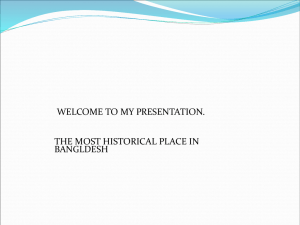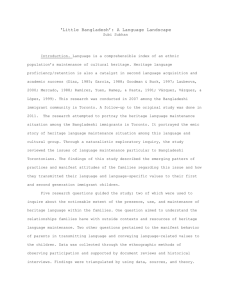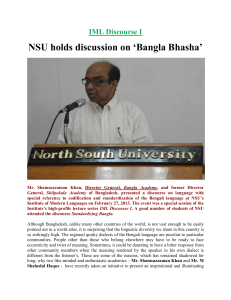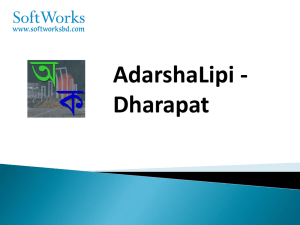Discourse on Sounds of the Mother Tongue at NSU
advertisement
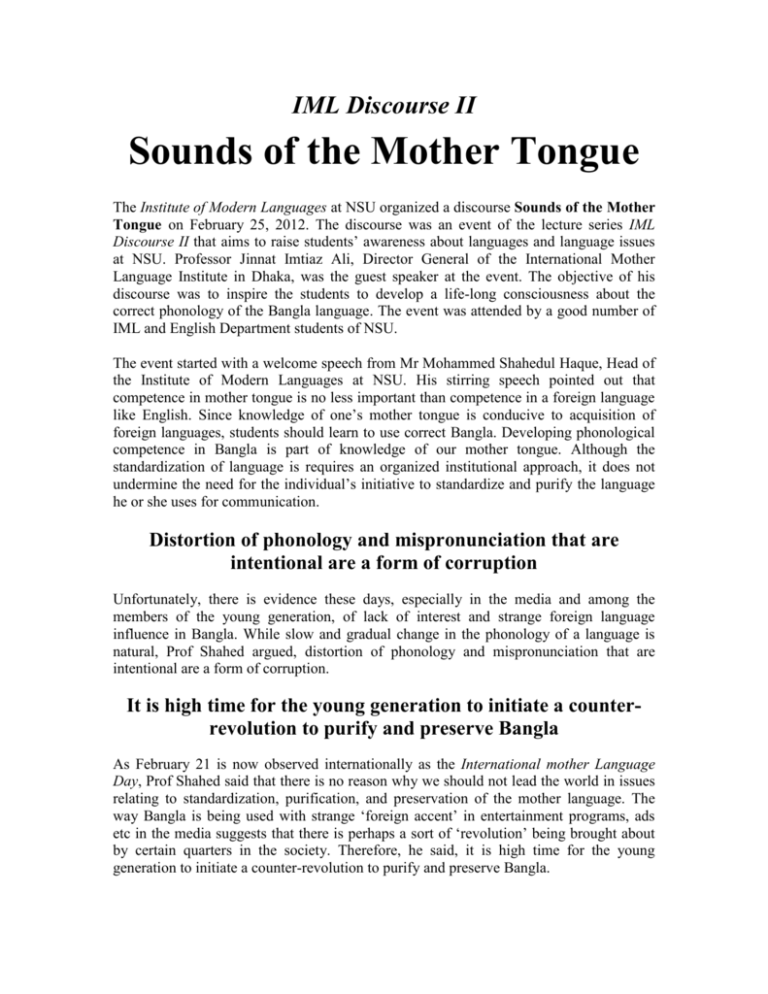
IML Discourse II Sounds of the Mother Tongue The Institute of Modern Languages at NSU organized a discourse Sounds of the Mother Tongue on February 25, 2012. The discourse was an event of the lecture series IML Discourse II that aims to raise students’ awareness about languages and language issues at NSU. Professor Jinnat Imtiaz Ali, Director General of the International Mother Language Institute in Dhaka, was the guest speaker at the event. The objective of his discourse was to inspire the students to develop a life-long consciousness about the correct phonology of the Bangla language. The event was attended by a good number of IML and English Department students of NSU. The event started with a welcome speech from Mr Mohammed Shahedul Haque, Head of the Institute of Modern Languages at NSU. His stirring speech pointed out that competence in mother tongue is no less important than competence in a foreign language like English. Since knowledge of one’s mother tongue is conducive to acquisition of foreign languages, students should learn to use correct Bangla. Developing phonological competence in Bangla is part of knowledge of our mother tongue. Although the standardization of language is requires an organized institutional approach, it does not undermine the need for the individual’s initiative to standardize and purify the language he or she uses for communication. Distortion of phonology and mispronunciation that are intentional are a form of corruption Unfortunately, there is evidence these days, especially in the media and among the members of the young generation, of lack of interest and strange foreign language influence in Bangla. While slow and gradual change in the phonology of a language is natural, Prof Shahed argued, distortion of phonology and mispronunciation that are intentional are a form of corruption. It is high time for the young generation to initiate a counterrevolution to purify and preserve Bangla As February 21 is now observed internationally as the International mother Language Day, Prof Shahed said that there is no reason why we should not lead the world in issues relating to standardization, purification, and preservation of the mother language. The way Bangla is being used with strange ‘foreign accent’ in entertainment programs, ads etc in the media suggests that there is perhaps a sort of ‘revolution’ being brought about by certain quarters in the society. Therefore, he said, it is high time for the young generation to initiate a counter-revolution to purify and preserve Bangla. He welcomed the recently passed High Court ruling that all TV and radio channels stop airing programs and advertisements that use distorted and foreign language influenced forms of Bangla. The rule has made the phonology of Bangla a national issue. To emphasize the above points, Professor Imtiaz began his discourse with the concept of standard language. UNESCO’s declaration concerning language has given importance on learning three languages - the mother language, a regional or national language, and an international language. As the geographical variations of Bangla or the social dialects are not intelligible for communication, the need for a standard language i.e. the language of education, office, parliament, trade and media arises. This standardization is equally important for written as well as spoken language. Although the standard of written language is maintained properly, unfortunately the large-scale use of distorted Bangla has put the standard of spoken language at stake. Therefore, to preserve the standard language, the understanding of phonology of Bangla (the study of the speech sounds of a language) has now become a significant issue. Prof Imtiaz’s discourse gradually focused on the different aspects of phonology of Bangla. Certain parts of his discourse were very enlightening and technical, and students with a background in linguistics can appreciate. He also entertained the students with the knowledge that children first acquire the consonant sounds. They make the easy lip sounds and words like ‘baba’ or ‘maa’ that fill their parents’ hearts with bliss and happiness. He explained how the areas and ways of sound articulation help us make common sounds in Bangla such as ‘ka’, ‘kh’, ‘ga’ etc. Teaching children the correct pronunciation, raising awareness among teachers and making them skilled through adequate training are also part of standardization of Bangla Despite the time constraint, his lecture was inspiring enough to raise the consciousness about using standard and correct pronunciation of words in Bangla. He ended his valuable discussion with a brief but precious suggestion to standardize the Bangla spoken language. Prof Imtiaz said that to standardize the Bangla language, having respect for our beloved mother tongue is of paramount importance. We also need a rule of pronunciation, an enriched dictionary, a good reference grammar, a strict legislation, an agreement of the constitution and an enriched literary tradition. Teaching children the correct pronunciation, raising awareness among the teachers and making them skilled through adequate training are also part of standardization of Bangla. Thus this rousing discourse ended with the hope that the students and members of today’s young generation will come forward to protect the Bangla language from foreign influence with the spirit people had in 1952 when the existence of the language was at stake.


